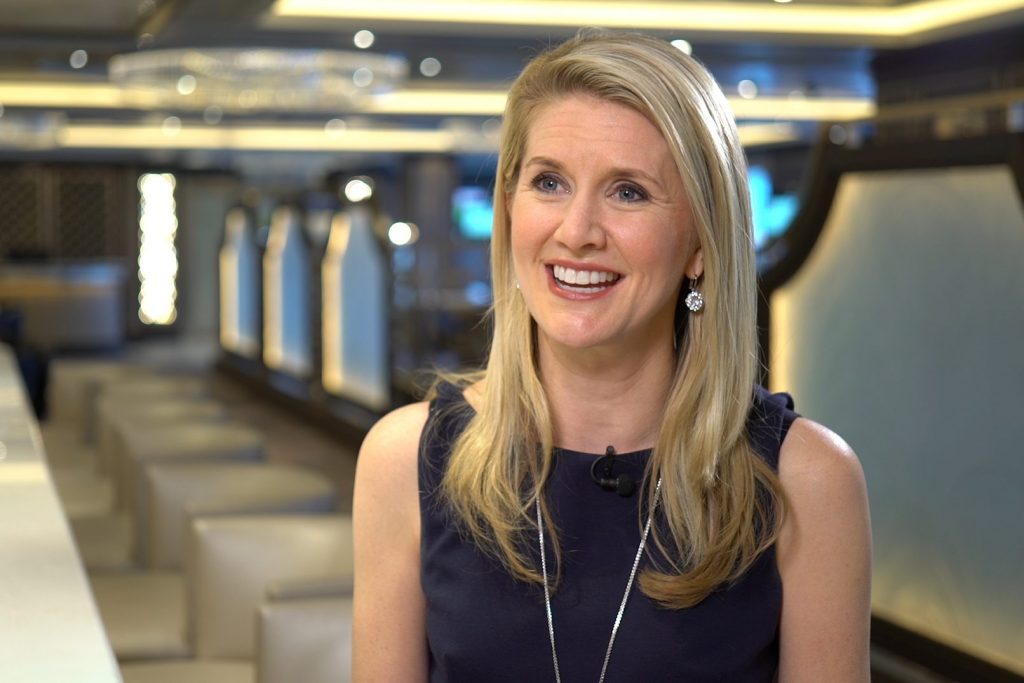Skift Take
Princess Cruises has a long history and widespread awareness, but the cruise line knows it can't rest on the past. President Jan Swartz talks about innovation, authenticity, and why diversity in leadership is good for business.
 More than 1,100 of travel's most forward-thinking insiders will gather for our annual Skift Global Forum in New York, September 27–28. In just a few years, Skift's Forums — the largest creative business gatherings in the global travel industry — have become what media, speakers, and attendees have called the “TED Talks of travel.”
More than 1,100 of travel's most forward-thinking insiders will gather for our annual Skift Global Forum in New York, September 27–28. In just a few years, Skift's Forums — the largest creative business gatherings in the global travel industry — have become what media, speakers, and attendees have called the “TED Talks of travel.”
Skift Global Forum 2018 will take place at Jazz at Lincoln Center’s Frederick P. Rose Hall in New York. This year's Forum speakers include CEOs and top executives from Uber, Airbnb, Delta Air Lines, Hyatt Hotels Corporation, Marriott International, and many more.
When Jan Swartz started working with Princess Cruises in 1997, initially as a consultant with Bain & Company, the storied cruise line was preparing to welcome the world’s largest passenger ship.
By today’s 5,400-passenger standards, Grand Princess was a wee little ship, with capacity for 2,600 guests. But at the time, it was a behemoth.
“At the time, we were acutely focused on ‘How do we grow dramatically while preserving the personal touch of how we serve at Princess?’,” said Swartz, who is now the cruise line’s president. “And today we are equally if not more focused on that, and yet have an enormous array of new technologies and tools and great diversity of crew members to help us do just that.”
In recent years, the operator, part of Carnival Corp., has expanded into several countries in Asia, launched a massive technology project called Ocean Medallion, and is about to mark its 50th year in Alaska in 2019. And, of course, Princess has added many new ships.
In July, the company announced a new generation of ships launching in 2023, the largest yet with space for 4,300 passengers. Swartz spoke to Skift about ship size, tech innovations, and being one of a handful of women in leadership positions at cruise lines. She appears at Skift Global Forum Sept. 28 with Celebrity Cruises President and CEO Lisa Lutoff-Perlo and Carnival Cruise Line President Christine Duffy.
This interview has been edited for length and clarity.
Skift: [Princess has] been around for a while without getting that big before. Why is now the right time — or 2023 the right time — to grow to that size, and what does that indicate about the line’s evolution?
Swartz: Princess has a complete range of ship size. Everything from Pacific Princess, which is 658 guests, to our new build pipeline which includes a 4,300-guest ship, and I believe that the Princess brand will always contain a range of ship sizes in order to match the demand for the wide variety of itineraries that we offer literally all over the world. So, I would say that while the brand continues to have new builds on order, we also love the assortment of ship size choice that we offer our guests.
Skift: What does that size let you do? What kind of flexibility does it give you to program a cruise that you don’t have now?
Swartz: If we think about the continuum of our ship size, our smallest ships allow us to do highly exotic itineraries and off the beaten path ports of call that receive small ships. Our larger ships allow us to offer a very compelling value for the most popular itineraries that Princess offers. So those would typically be in the Mediterranean, in the Caribbean, in Alaska, where a larger ship size allows us to offer an extraordinary range of amenities, dining, entertainment venues, ways to explore on board as well as ashore.
Skift: We’ve been talking about this idea of a post-experience economy, basically saying if marketers want to call everything an experience, how do you keep that from becoming a commodity? So from a cruise perspective, how do you think about that, especially considering there are X number of options passengers can have?
Swartz: I think it’s a really interesting question about what will define the post-experience economy and what we would say is it will be authentic versus fake experiences. And Princess is absolutely focused on the authentic experience business. An example of that is our 50 years of experience in Alaska and all of our unique relationships on the ground, our deep understanding of the culture, and all of that is brought to bear in how we design an experience for our guests that is truly authentic and very respectful of the cultures that we’re visiting.
Similarly, we have a program in Australia/New Zealand called “Across the Ditch” which speaks to sailing between Australia and New Zealand, and we have long served that market and created very exclusive excursions in New Zealand that really showcase the cultures of the various ports of calls that we do … As we think about this post-experience economy and everyone starts to use this word “experience,” our belief is guests are really smart. Consumers are really smart and they know what is authentic and what is fake and so I think the companies that are truly focused on delivering authentic experiences will pull away from the pack in the post-experience economy.
Skift: I want to ask about Ocean Medallion, which you guys announced at the beginning of last year. I know it’s been kind of rolling out in phases on the first ship, not quite as quickly as everybody expected. What’s going on with that and what have you learned about this kind of technology and how to implement it?
Swartz: Ocean Medallion is an experience transformation project, not a technology project, and that requires an enormous amount of vision and change management. So we are very pleased with the progress that our team has been making in delivering the very facets of the Ocean Medallion experience … What I can say is that as we sit here today, Caribbean Princess in particular is the most connected ship on the planet, so over a month ago we launched MedallionNet, which delivers what some thought was not possible, which is land-like speed at scale for the entire ship, guest and crew. What that means is that a part of the cruise experience that used to have a little friction is now fast, affordable, reliable, and allows people … to be able to explore, relax and connect with those they love in amazing ways.
I was just on Caribbean Princess two weekends ago, and what that means to each guest is quite different. But with MedallionNet on Caribbean Princess, what you now see is couples where a gentlemen may be reading a book while his wife is streaming her favorite football game. And guests are saying, “I like to disconnect when I’m on vacation but I’m so grateful that I could check in with my dog walker for five minutes and that allowed me to relax in a whole new way.” So there used to be a technical question — Could you deliver land-like speed at sea? — and we’ve proven absolutely you can. It exists today on Caribbean Princess like no other ship in the world. And how guests engage with the capability is really up to them.
Skift: And are you able to do the kinds of things that you were envisioning like anticipating their needs and the concierge-level service and kind of finding them and tracking their preferences and stuff like that? Is all of that following that connectivity?
Swartz: We’re rolling it out in layers, so all that work is underway, but as we sit here, the foundational layer of MedallionNet is live, operating. Our guests on Caribbean Princess and our crew on Caribbean Princess are experiencing land-like speed, such that they can FaceTime with their friends, watch Netflix, stream their favorite football game, as if they were in a hotel on land.
Skift: You’re one of a small number of women in leadership at cruise lines; we’ll have the bulk of you on stage together. But not just at cruise lines, also in the travel industry. Do you have any idea why there aren’t more of you, and what do you think needs to change to empower more diverse leadership or to make better paths for women to be in leadership roles in travel?
I think we’re seeing, more and more, leadership defined as a set of skills independent of gender, color of your skin, flavor of the day, or whatever. I can speak to Carnival Corporation led by Arnold Donald, who has made diversity and inclusion a real focus of our corporation … We believe, and I think our results have proven this to be true, that diverse teams are not just the right thing to do, but they’re really good for business because everybody brings their own lens to a problem or an opportunity and you get to more effective solutions faster with diverse input. And so we at Carnival Corporation believe diversity is a source of competitive advantage and I absolutely see that happen every day here at Princess Cruises.
The Daily Newsletter
Our daily coverage of the global travel industry. Written by editors and analysts from across Skift’s brands.
Have a confidential tip for Skift? Get in touch
Tags: princess cruises, sgf2018, skift global forum
Photo credit: Princess Cruises President Jan Swartz will speak next week on a cruising superpanel at Skift Global Forum. Princess Cruises
